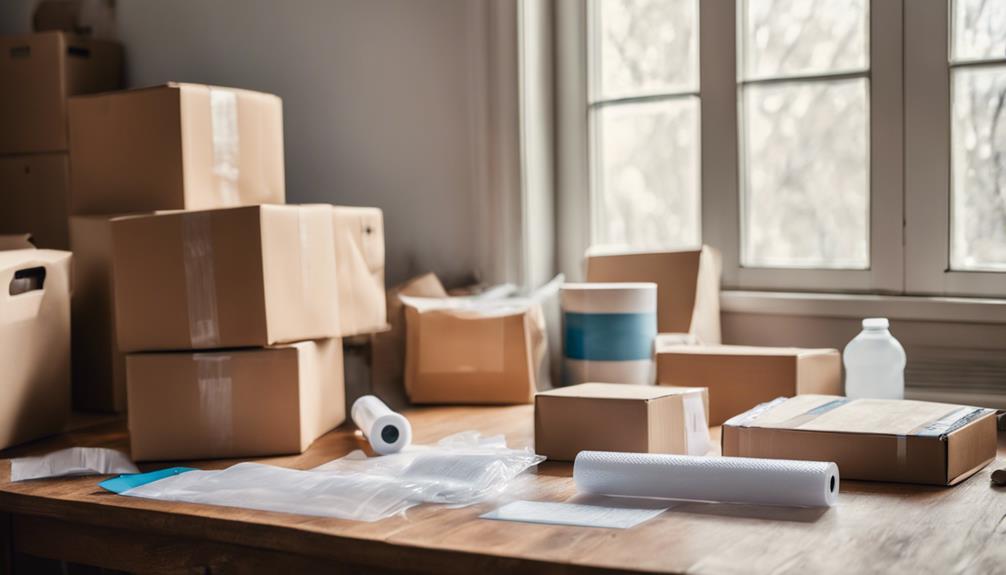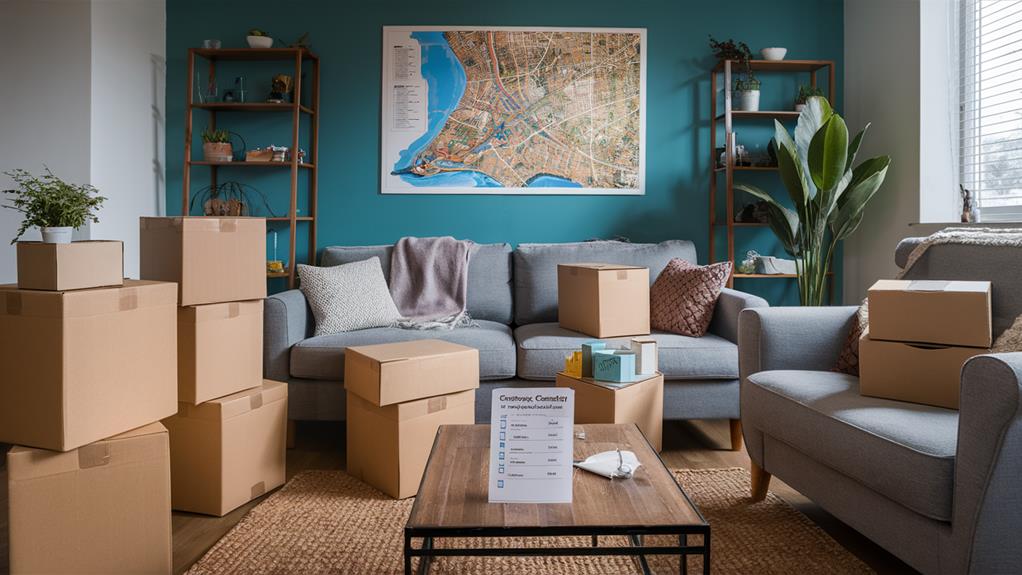Moving doesn’t have to be a nightmare. Start by planning eight weeks in advance. Create a moving binder for important documents, research moving companies, and compare quotes. Decluttering can help reduce stress and save money. While packing, gather necessary supplies and label each box clearly. Don’t forget to update your address and schedule utility transfers. After the move, unpack systematically and explore your new neighborhood. Staying flexible and communicating with friends and family for support can make the process smoother. For a more detailed exploration of tips and strategies, you’ll find valuable insights as you continue.
Importance of Moving Preparation

Moving preparation is crucial for a successful transition to your new home. When you start planning your move, a well-structured moving checklist can be your best friend. Ideally, you should begin this process eight weeks before moving day. This timeline helps you track tasks and deadlines, ensuring nothing slips through the cracks.
Creating a moving binder or digital folder to store important documents will keep you organized and make finding paperwork easy whenever you need it. As you research moving companies, remember to compare reviews, quotes, and referrals to make an informed choice. If you’re considering hiring professional movers, this research will help you find reliable help.
Another essential step is to inventory and declutter your belongings early on. This not only reduces excess items but also simplifies packing, saving you time and packing materials.
Lastly, don’t forget to schedule utility transfers and internet setup in advance. Taking care of these details ahead of time will help avoid disruptions and ensure a smooth transition to new services.
Packing and Address Changes
Packing efficiently and managing address changes are vital steps in ensuring a smooth transition to your new home. Start by gathering all necessary packing supplies, like boxes, tape, bubble wrap, and markers. Consider using uniform box sizes to make the moving process easier.
Create a moving packing checklist, tracking your items and starting with non-essentials weeks before the move. This helps reduce last-minute stress.
As you pack items, label each box clearly with its contents and the room it belongs to in your new home. This organization will make unpacking much simpler when you arrive.
Don’t forget about your address change. Update your address with the post office and notify relevant institutions, like banks, healthcare providers, and subscription services. This ensures smooth transitions without service interruptions.
If you’re hiring movers, get moving estimates ahead of time to plan your budget. Keep a record of all notifications sent regarding your address change, so you don’t overlook important contacts or services.
Post-Move and Settling In

Transitioning to a new home can be both exciting and overwhelming, and the post-move phase is crucial for settling in comfortably.
Start by reviewing your moving checklist to ensure you’ve completed essential tasks like transferring utilities and unpacking essentials.
Here’s a simple guide to help you through this phase:
- Unpack Systematically: Begin with the most essential rooms, such as the kitchen and bathroom, to make your new home functional right away.
- Create an Emergency Plan: Familiarize yourself with safety features like smoke detectors, exits, and fire extinguishers in your new home.
- Explore Your Neighborhood: Take a walk and locate important resources like grocery stores, healthcare facilities, and schools to make your transition smoother.
- Evaluate Your Moving Experience: Document lessons learned during the move. Identifying areas for improvement can help you ensure smoother transitions for future moves.
Specific Moving Scenarios
Whether you’re relocating across town or across the globe, understanding the specific challenges of your move can make all the difference.
For long-distance moving, it’s crucial to research and select a moving company that’s experienced in this type of relocation. Make sure they’re licensed and insured to safeguard your belongings.
If you’re planning an international move, be sure to obtain necessary visas and familiarize yourself with the customs regulations of your destination country. This preparation will help you avoid delays and complications.
Creating a timeline can also streamline the moving process; include tasks like packing essential documents, making travel arrangements, and coordinating your moving date.
Packing essential documents, such as birth certificates and immunization records, is vital for international moving, ensuring you have everything readily available.
Additionally, understanding local customs and laws in your new country can make your transition smoother. Connecting with expatriate communities can provide valuable support and guidance during your adjustment.
Flexibility and Support During the Move

Moving can bring unexpected changes, so it’s essential to stay flexible and prepared.
You might need temporary housing or quick solutions, so having a checklist can help you manage these surprises.
Plus, keeping communication open with friends and family ensures you have the support you need during this transition.
Preparing for Unexpected Changes
Unexpected changes can throw a wrench in your moving plans, but staying flexible is key to navigating the chaos. To prepare for these unexpected changes, consider the following checklist:
- Secure Temporary Housing: Have a backup plan for where you’ll stay if your new home isn’t ready.
- Pack Essentials Quickly: Create a moving bag with items you’ll need immediately, like clothes and toiletries.
- Notify Important Parties: Inform your employer, utility companies, and any other necessary contacts about your move.
- Develop a Plan B: Ensure you have alternative housing options and access to emergency funds for unforeseen expenses.
Keeping contact information for affordable moving services handy lets you resolve last-minute challenges quickly.
Stay adaptable to changes by maintaining a positive mindset, knowing that obstacles might arise during the moving process.
Prioritize self-care by practicing mindfulness techniques and staying in touch with your support network for emotional stability.
By being prepared, you can handle unexpected changes and make your moving experience smoother.
Temporary Housing Solutions
Finding suitable temporary housing can provide the flexibility you need during your move. When you’re in transition, options like short-term rentals, extended-stay hotels, and serviced apartments can help make the process smoother.
These temporary housing solutions often come with amenities that make life easier, such as kitchen facilities, laundry services, and even pet-friendly options, which can be crucial for families and pet owners.
As you explore your choices, consider the location of your temporary housing. It should be convenient for daily activities like work, school, or shopping. Additionally, keep your budget in mind; using platforms like Airbnb or Vrbo can lead you to unique options that might be more cost-effective than traditional hotels.
Before making any commitments, always read reviews and verify the terms of your temporary housing arrangements. This diligence helps avoid unexpected issues during your stay.
Ultimately, finding the right temporary housing can ease your transition, providing you with the flexibility and support needed as you settle into your new home. Staying organized and informed will help ensure that this part of your move is as stress-free as possible.
Communicating With Support Networks
While you navigate the complexities of relocating, keeping open lines of communication with your family and friends is crucial for both emotional support and practical assistance.
Establishing a support network early on can significantly reduce stress during the moving process. Here are some key ways to communicate effectively with your support network:
- Share Specific Needs: Let your family and friends know exactly how they can help, whether it’s packing boxes, coordinating logistics on moving day, or settling into your new home.
- Set Timelines: Clearly communicate your moving schedule, including when you’ll need help. This helps everyone stay organized and prepared.
- Encourage Flexibility: Life can be unpredictable, so ask your support network to remain adaptable. Last-minute changes can happen, and a flexible approach makes things easier.
- Regular Check-Ins: Keep in touch with your network throughout the process. This helps manage expectations and allows everyone to adjust to any unexpected challenges.
Budgeting for Your Move
Budgeting for your move is crucial to ensure you manage your expenses effectively and avoid financial surprises. The average cost of a local move is about $1,250 for a three-bedroom home, while long-distance moves can range from $2,000 to over $5,000.
When budgeting, don’t forget to include additional moving expenses like packing supplies, fuel, tolls, and potential hidden fees for stairs or elevators.
Start by obtaining quotes from multiple companies to compare prices and services. This way, you can find a professional mover that fits your budget. Creating a detailed moving budget is essential. List all potential expenses, including rental trucks, labor, insurance, and utility transfers. This will help you avoid unexpected costs.
Consider cost-saving strategies, too! Getting rid of items you no longer need can significantly reduce your moving volume and expenses.
Booking movers well in advance and choosing off-peak moving dates can also lead to better rates. By carefully planning and budgeting for your move, you’ll not only save money but also reduce stress, making the entire process smoother and more manageable.
Frequently Asked Questions
What Should I Do With Hazardous Materials During a Move?
When you’re moving, it’s important to handle hazardous materials safely.
Start by checking local regulations on disposal; some items, like paint and chemicals, can’t be thrown away with regular trash. You might consider donating usable items to local organizations or contacting a hazardous waste facility for proper disposal.
Never mix different substances, as this can create dangerous reactions. Always prioritize your safety and the environment when dealing with these materials during your move.
How Can I Ensure My Pets Are Safe During the Move?
To ensure your pets are safe during the move, start by keeping them in a quiet, secure room to minimize stress.
Use a familiar crate or carrier, and make sure they’ve their favorite blanket or toy.
Schedule a vet visit to discuss travel tips and any necessary medications.
During the move, check on them frequently, and avoid leaving them in a hot car.
Lastly, maintain their routine as much as possible after the move.
What to Do if My Moving Company Cancels Last Minute?
If your moving company cancels last minute, stay calm and take action.
First, contact them for an explanation and see if they can reschedule.
Next, search for alternative moving companies—check reviews and availability.
If you’re short on time, ask friends or family for help.
Also, consider renting a truck or using a portable storage container.
Lastly, remember to review any contracts to understand your rights and possible refunds.
How Do I Handle Moving During Inclement Weather?
When you’re moving during inclement weather, stay prepared and flexible. First, check the weather forecast regularly. Have a backup plan in case conditions worsen.
Ensure your movers are aware of the weather, as they may need to adjust their plans. Pack your belongings securely to prevent damage from rain or snow.
Are There Tax Deductions Available for Moving Expenses?
When it comes to tax deductions for moving expenses, it depends on your situation.
If you’re an active-duty member of the military, you might qualify for deductions related to your move.
Unfortunately, for most other taxpayers, moving expenses are generally not deductible under current tax laws.
Always check the IRS website or consult a tax professional to see if any new rules apply that could affect your eligibility for deductions.
Conclusion
In conclusion, preparing for a move can make the process smoother and less stressful. By staying organized, packing efficiently, and addressing changes early, you set yourself up for success. Remember to stay flexible and lean on your support network when needed. After the move, take the time to settle in and make your new space feel like home. With careful planning and budgeting, you’ll navigate your move with confidence and ease.
